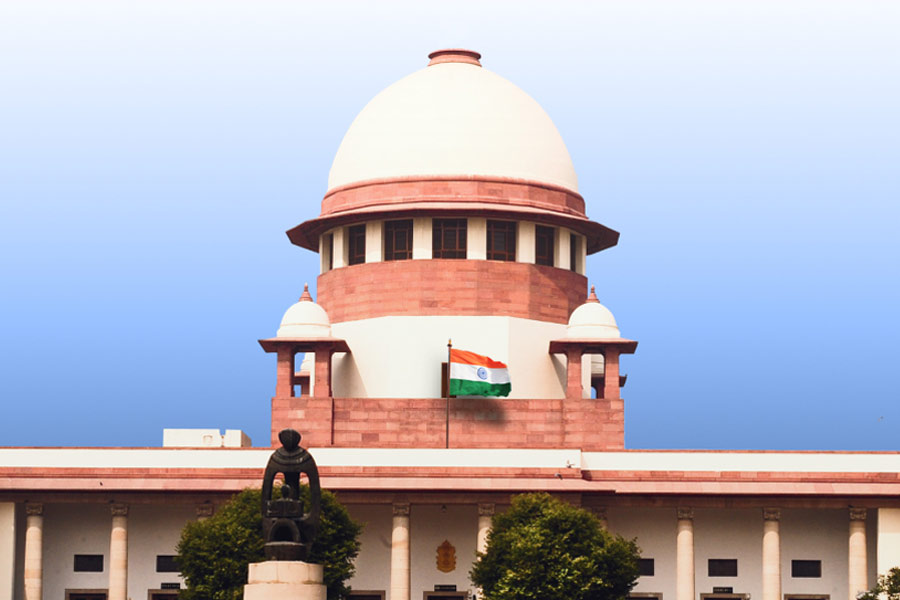
SC Simplifies Divorce Process: A Shorter Path to Separation?
Don't Miss
- Multiple Arrests Made as Security Forces Intensify Crackdown on Insurgent Activities in Manipur
- 4 UNLF (Pambei) Militants Injured in Clash with Arambai Tenggol Members
- Cash-recovery row: In-house inquiry procedure enters crucial second stage; could lead to serious consequences for judge if misconduct proved
Even after a verdict is passed by a matrimonial court, either of the spouses can challenge it in the high court, which further prolongs an already protracted process
TT New Delhi, 30.10.24 : The Supreme Court has exercised its extraordinary constitutional powers under Article 142 to dissolve the marriage of a couple on the ground of “irretrievable breakdown”, helping them avoid years-long divorce proceedings in matrimonial courts.
Even after a verdict is passed by a matrimonial court, either of the spouses can challenge it in the high court, which further prolongs an already protracted process.
Article 142 says: “The Supreme Court in the exercise of its jurisdiction may pass such decree or make such order as is necessary for doing complete justice in any cause or matter pending before it, and any decree so passed or order so made shall be enforceable throughout the territory of India in such manner as may be prescribed by or under any law made by Parliament and, until provision in that behalf is so made,
in such manner as the President may by order prescribe.”
In the present case, the wife, Sapna Negi, had moved the apex court seeking a transfer of the matrimonial case she had been fighting for the past one year with her estranged husband, Chaman Singh, from the court of the principal judge, family courts, Roorkee in Uttarakhand, to the family court at the Patiala House Courts in New Delhi. The couple married on May 12, 2013, and have a daughter.
Singh filed a petition under Section 13(1)(i-a) of the Hindu Marriage Act, 1955, for the grant of a decree of divorce, alleging that Negi had breached his trust by being in a relationship with another person and refusing to return home.
The wife, however, contended that because the husband neglected her and their minor daughter, she was left with no option but to return to her parents’ home, where she said she had been living since 2019.
The Supreme Court, to explore the possibility of the parties arriving at a settlement, referred the matter to its mediation centre, which on July 24 this year said the efforts at reconciliation had failed.
“In the factual scenario explained herein above we are of the considered view that the exercise of the power under Article 142(1) of the Constitution of India is warranted in the facts and circumstances of the case and also to do complete justice between the parties particularly in the background of this court having noted herein above that marriage between the petitioner and the first respondent has completely failed and the parties had not cohabitated from 2019 till date and there being no possibility that the parties will cohabitate in future,” a bench of Justice B.R. Gavai, Justice Aravind Kumar and Justice K.V. Viswanathan observed in its judgment.
“Hence, we are of the view that continuation of the proceedings before the trial court could only be an ordeal which both the parties will have to undergo.
“And we are of the considered view that marriage between the petitioner and respondent having irretrievably broken down, exercise of power by this court under Article 142 of the Constitution is called for in the facts and circumstances obtained and also keeping in mind that petitioner and first respondent are quite young, namely 32 years and 38 years, respectively and have a future ahead of them.
“It is also undisputed that the daughter... born out of this wedlock is aged about eight years and has been residing with the petitioner wife from the year 2019,” Justice Kumar, who authored the judgment, wrote.
The bench directed Singh to pay a permanent alimony of ₹13 lakh in addition to the ₹7 lakh already deposited in the account of the minor to take care of her financial interests. Negi is a teacher in a government school.
“Hence, the marriage solemnised on 12.05.2013 between the petitioner and first respondent husband stands dissolved by granting a decree of divorce in exercise of the power vested under Article 142(1) of the Constitution. Petition stands disposed of accordingly,” Justice Kumar said.


0 Response to "SC Simplifies Divorce Process: A Shorter Path to Separation?"
Post a Comment
Disclaimer Note:
The views expressed in the articles published here are solely those of the author and do not necessarily reflect the official policy, position, or perspective of Kalimpong News or KalimNews. Kalimpong News and KalimNews disclaim all liability for the published or posted articles, news, and information and assume no responsibility for the accuracy or validity of the content.
Kalimpong News is a non-profit online news platform managed by KalimNews and operated under the Kalimpong Press Club.
Comment Policy:
We encourage respectful and constructive discussions. Please ensure decency while commenting and register with your email ID to participate.
Note: only a member of this blog may post a comment.